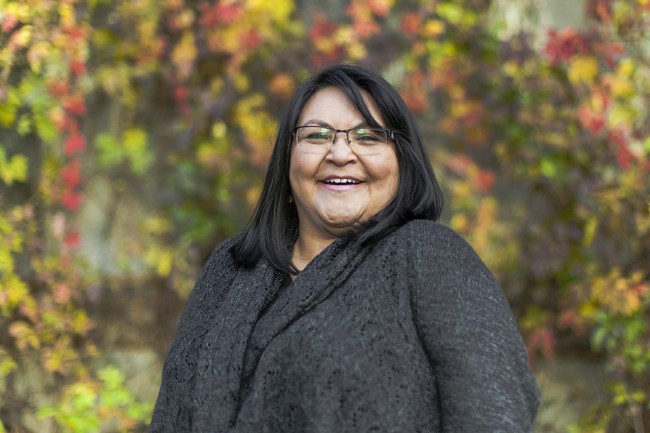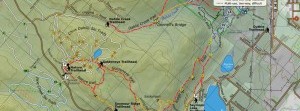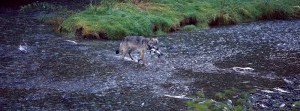
Eden Robinson
For the stories of First Nations people to endure, they need to be relevant. That’s the view of Kitimat-based author Eden Robinson, a Haisla and Heiltsuk woman of growing renown in contemporary Canadian literature. Robinson is enjoying considerable attention at the moment, largely due to the release of her new book Trickster Drift. The movie adaptation of her award-winning novel, Monkey Beach, was also recently shot on-location in Kitimat.
Robinson was out of town during much of the filming, narrowly missing a meeting with the some of the principals, one of whom is Adam Beach. She also decided against a cameo role, distancing herself from the production process. The author penned an initial draft of the script, and then abruptly fired herself.
“I don’t love adapting my own work,” she admits. Her sister, Carla Robinson, is very much involved in the movie as an associate producer, and guarantees Robinson isn’t entirely out of the loop.
A writer who crafts her work from personal experience, Robinson has set many of her plots in northern BC. It’s no stretch for readers familiar to the region to place themselves in Robinson’s scenes, as characters engage in everyday tasks such as working at the Kitimat DQ or catching a bus to Terrace.
Her hours devoted to working on Trickster Drift elicited intense, messy moments for her in real life.
“I have a weakness for dysfunctional family drama. My stories aren’t gentle and I like complex characters; I cry when they cry,” she says.
Robinson’s emotional connection to her protagonists is a bond she’s nurtured over time. The Trickster trilogy began as a short story several years ago and seemed to gain a self-sustaining momentum, evolving first into a novella and now, a three-part series. She’s had a difficult time moving on from the characters, not unlike the experience of her readers.
A large part of Robinson’s audience is comprised of teenagers and Monkey Beach has been hit the prescribed reading list at some BC schools. Robinson says the writing workshops she held with students were insightful and inspired her to continue reaching out to a younger generation.
“That’s the kind of energy I wanted for Son of a Trickster (the first instalment in the trilogy),” she adds.
When she was younger, John Robinson, Eden’s father, would relate stories and local legends to his daughter, who soaked up the alluring tales of Wee’git, b’gwus, and others. The author sought to ensure the messages and magical realism weren’t lost over time. She conjured modern narratives with old bones, works of fiction boasting elements of cultural tradition that young people could relate to.
Trickster Drift is dedicated to John Robinson and his influence that remains a contributing factor to his daughter’s art today.
The preservation of Haisla history is a priority for Robinson. She reveals that as of last year, there were only 99 native Haisla speakers left. That’s a discouraging plunge from the 240 fluent Haisla speakers reported by the Kitamaat Village Council to the First Peoples’ Language Map of British Columbia in 2010.
There is a certain responsibility that goes along with being a storyteller, and Robinson is very aware of this. It’s more a role she assumed, rather than coveted, some years ago, when Indigenous voices were not as strong as they are now. She said the pressure to be primarily an ambassador has eased.
“I’m comfortable in creating my worlds, as long as I’m not stepping on cultural toes. Some stories are off the table, while others are fair game. It’s important to share these with our children.”
A national promotional tour, university lectures, and family commitments leave little time for relaxation. But Robinson grabs it when she can. Perhaps unsurprisingly, reading in the bath is a favourite indulgence. Self-care and personal health are a priority, too. She made a conscious effort to prepare for the book tour, which required considerable stamina, organization, and a willingness to socialize on demand. An introvert, Robinson said one of the most valuable experiences in her early career was doing improvisational theatre and overcoming the heckles of her devoted friends.
Whatever her creative process involves now, it’s yielding success. Her work has been recognized with several awards. Robinson made the 2017 Scotiabank Giller Prize shortlist with Son of a Trickster, she won the Writers’ Trust Engel/Findley Award in 2016, and her widely-distributed Monkey Beach took the 2001 Ethel Wilson Fiction Prize. Monkey Beach also made CBC’s Great Canadian Reading List: 150 Books to Read for Canada 150.
Eden Robinson exudes warmth and contentment, with a dash of near-hysterical laughter on occasion: her sunny nature a contrast to the darkness of her work. With the Monkey Beach movie due out in 2019 and the final Trickster novel not far off, Robinson will likely have more reason to entertain us with her infectious giggle. And if you hang around the Kitimat Library often enough, you might even get to hear it in person.
— Sian Fullerton



